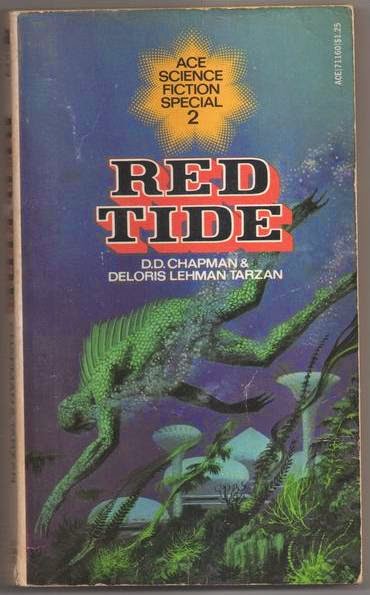© 1975 by D. D.
This was not a
great book, but it’s great to me because of its placement in my life.
I’d imagine
there’s a point in many a young lad’s life where he snoops around in his
father’s desk drawers and finds something shocking. Maybe cigarettes, maybe a dirty magazine,
maybe a gun – who knows? All I know is
that I once pulled out a drawer in the hutch in our dining room and found five paperback books.
Now, it wasn’t
snooping in his desk, bureau or dresser or something like that. The dining room was a public area in my
little house growing up. But I vividly
recall to this day, at least thirty-five years later, opening that drawer and
seeing those books for the first time.
Nothing else was in the drawer, just five books. I withdrew them out one by one, studying the
front and back covers, leafing through the pages. Who put them there? Must’ve been my father. Couldn’t have been my younger brother or my
mother. Had to have been him.
I remember the
titles still: Who Can Replace a Man? by
Brian Aldiss; The Barbarian at World’s
End by Lin Carter; a novelization of the George C. Scott movie Hardcore (?!?); these stand out, plus a
hazy image of a Zane Grey novel with a shark on the cover (?) whose name I
forgot.
And, of course, Red Tide. See the iconic (to me, at least) image below:
I immediately
snuck one and read it, then moved on to another. Aldiss confused and terrified me. Carter fascinated me and, had I read it a
year or two later, might have ignited a passion for archaeology. And I remember spending hot summer evenings
in my top bunk bed reading the tale of an underwater oceanographic research
facility cut off from a war-torn surface, with water-breathing men or
something-or-other thrown in for good measure: such was Red Tide.
Though I am
certain I read the whole thing, I forgot 99.9 percent of it as I entered
teenagehood and life waylaid me. By the
time I could legally buy a beer, I could probably describe, if pressed, that
book cover and name two characters: Mattern and Loera. That’s it.
Fifteen years
ago I stumbled across that cover (that cover! that cover!) in a used book bin in
a forgotten used book store (in Massachusetts, I kinda sorta think) and picked
it up without hesitation. It leapfrogged
up the two or three On-Deck books and I read it immediately. Then, as happened nearly twenty years prior,
I immediately forgot it. Plot specifics,
characters others than Mattern and Loera, setup and denouement, etc. The one thing that did vaguely settle over my
consciousness concerning the book was that it did not seem to be the same tale
I read as a boy.
Earlier this
summer I was rummaging through some boxes of books and – whoa! there’s fishman
of the sea! – I spotted Red Tide nestled
among some old college textbooks. Should
I read it again? No memory of the last
re-read, but … it’s only two hundred pages and looks to be a quickie. So again I bumped it up on the reading list
and this past weekend blew through it in two days.
Verdict: well,
c.f. the first sentence of this post.
The good: The
setting. Cobb Seamount, the deep-sea
underwater research facility is downright claustrophobic, cramped,
nerve-wracking. The deeper you go the
heavier the air must be to breathe, going up to 200 atmospheres at the very
bottom, Down Under. The biochemistry
creeped me out, things like the dangers of metabolizing hydrogen and going
coprophagic if you stay down at 200 atmospheres too long, though I have no idea
if this is true or not.
Also good: the
setup. A garbled radio message orders
Mattern, an ex-diver and now administrator of the facility, to destroy the
floating radio station above Cobb. Now
there’s no communications with the outside world, and no one knows what has
happened (nuclear war? biological war?).
Soon, as happens in such closed quarters, everyone is at everyone else’s
throat in no time.
Bad:
Dialogue. People just don’t talk they
way normal people do. Maybe it’s because
normal people ain’t 500 feet below the ocean waves in a
possibly-post-apocalyptic world, I dunno, but I couldn’t see sensible,
professional, highly-trained people speaking – and acting – this way. Maybe the authors were trying to indicate
tempers flaring due to intense stresses involved. It just didn’t come across that way to me, a
humble reader.
Also bad: the
unfolding plot. A minisub trip to
another undersea complex run by a Bondian villain and decked out with extras
from Airport 75. I couldn’t stop visualizing bell bottoms and
pantsuits, medallions over hairy chests and a lot of “what’s your sign,
baby?” A scientist who chucks all
morality to the side to create a race of men who can breathe under water. A lovestruck tough guy who inexplicably dons
a pressure suit and descends hundreds of feet to “save” a woman who has zero
interest in him. Two scientists deciding
on inexplicable spur-of-the-moment, uh, intercourse. A bunch of trigger-happy sub captains afflicted
with what seems like roid rage.
Supposedly top-notch researchers abandoning all adherence to chain of
command to mutiny with a grungy crab famer.
So … a mixed
bag. But who knows? Maybe I’ll re-read it again, this time when
I’m 60, and it will be an entirely different novel. Maybe it’s a work that changes as the reader
does. Maybe it functions as a sort of
mirror to the psyche of whoever turns it’s pages. Maybe – maybe –
Grade: C. And that involves a huge curve because of that cover!!!


















